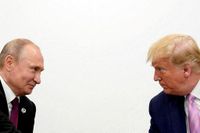In a dramatic turn of events, U.S. President Donald Trump is facing mounting challenges in his efforts to negotiate a swift end to the ongoing war in Ukraine. Over two months after his return to the White House, Trump's "contract for peace" negotiations have come to a standstill, with both sides engaged in a blame game that complicates the already fragile situation.
During a two-and-a-half-hour telephone call with Russian President Vladimir Putin on March 18, 2025, followed by 12 hours of talks between their delegations in Riyadh on March 24, no date has been set for a summit between the two leaders. Frustrated but confident, Trump admitted that Russia could be "dragging their feet" in the negotiations.
On the Russian side, the Kremlin has offered a few false concessions while reiterating its maximalist positions and imposing its own timeline. The lack of a joint declaration following the talks has led to separate statements that have only fueled confusion. While the White House announced a ceasefire on energy infrastructure, the Kremlin quickly limited this cessation of hostilities to just 30 days.
In the aftermath of the talks, the U.S. celebrated what it claimed was a truce in the Black Sea. However, Russia countered that this would only occur after the lifting of Western sanctions, which it argues unfairly target its exports of grain and fertilizers. A senior European diplomat, familiar with the negotiations, remarked, "Trump did not obtain a total ceasefire. He thought he was the strongest, but Putin dominates." This sentiment reflects a growing concern that Washington's priority has shifted from Ukraine's security to a broader rapprochement with Russia.
Meanwhile, Kyiv is equally frustrated. Ukrainian President Volodymyr Zelenskyy recently expressed his readiness for a ceasefire but accused Putin of being unwilling to stop hostilities. "I clearly showed that we are ready to cease fire. But you will see now that [Russian President Vladimir] Putin is not ready," Zelenskyy stated during a press conference in Kyiv. He urged Trump to apply strong pressure on Putin with sanctions instead of removing them.
As the negotiations falter, Trump has also unveiled a controversial "minerals deal" that has raised eyebrows among international observers. According to a report by The Telegraph, the deal demands substantial reparations from Ukraine and claims half of its oil, gas, and hydrocarbon resources, as well as a significant portion of its metals and infrastructure. Alan Riley, an expert on energy law at the Atlantic Council, described the document as an "expropriation document" with no guarantees or defense clauses.
Critics of the deal argue that it seeks to incorporate Ukraine into America's resource industries, effectively treating the nation as a province of the U.S. energy sector. The deal aligns with parallel talks between the U.S. and Russia for a comprehensive energy partnership, which includes plans to restore West Siberian gas flows to Europe. This revived gas trade would utilize Ukraine's infrastructure, further entrenching U.S. interests in the region.
The proposed United States-Ukraine Reconstruction Investment Fund would control critical minerals and other resources, with three of its five board members chosen by the U.S. America would receive all royalties until Ukraine pays off at least $100 billion in war debt, with a 4% interest rate added. Ukraine would only receive 50% of the royalties once its debts are cleared.
Moreover, the fund is registered in Delaware but operates under New York jurisdiction, giving the U.S. the first right of refusal on all projects. This raises concerns about the potential for the U.S. to veto sales of Ukraine's resources to other countries, which could complicate Ukraine's relationships with its European neighbors.
As the situation unfolds, the European sanctions regime appears to be nearing disintegration. Hungary and Slovakia have signaled their unwillingness to support the continuation of existing sanctions, which could automatically expire in July. If even one EU member state votes against the asset freeze, the Central Bank of Russia could withdraw €200 billion from European holdings, effectively undermining the West's efforts to contain Russian aggression.
Trump's approach to the Ukraine crisis is drawing criticism from various quarters. Observers fear that his focus on securing economic contracts with Russia and the potential for a lucrative energy partnership may come at the expense of Ukraine's sovereignty and security. Some analysts suggest that Trump's willingness to negotiate with Putin, while simultaneously demanding reparations from Zelenskyy, could be seen as a diplomatic disaster for the West.
General Jeff Kruse, head of the U.S. Defense Intelligence Agency, testified that Russia is facing significant challenges in prosecuting the war and may run out of steam by the end of the year, provided the West maintains its resolve. However, the current trajectory of U.S.-Russia negotiations raises questions about the effectiveness of Western strategies and the potential for a unified response to Russian aggression.
As the blame game continues between Kyiv and Moscow, both sides are keenly aware that their actions will influence Trump's perception and decisions. With the stakes higher than ever, the future of Ukraine hangs in the balance as the world watches closely.






